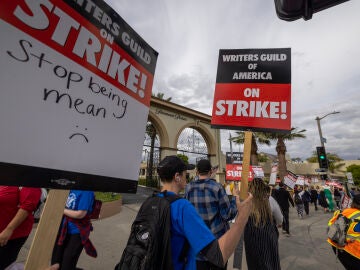
The Hollywood screenwriters They have been on strike for almost four months. Although the actors and actresses did not join until July, the Screen Actors Guild of America (WGA), which represents some 11,500 members, has been demonstrating daily in front of the studios of the different production companies in Los Angeles demanding a new collective agreement that entails, among other things, wage increases and regulation of artificial intelligence.
On August 11, within the framework of the protests, the Film and Television Producers Alliance (AMPTP), which represents some 350 production companies (such as Paramount, Disney or Warner Bros.) gave the writers a first offer to negotiate on, and the content of this offer was not made public until this week. On August 22, when a demonstration in support of the strikes for National Solidarity Day was held in front of the Disney studios, the AMPTP made public its offers to the writers’ collective, a “comprehensive package of proposals that addresses all the issues that the union has identified as its priorities”, in the words of the AMPTP.
This offer, according to the alliance, “recognizes the fundamental role that writers play in the industry” and “underlines the commitment of companies in the sector to end the strike, they indicated in a statement issued without prior notice. The president of the AMPTP, Carol Lombardini, has assured that the alliance’s priority is to “put an end” to the stoppages, which have lasted for almost four months, “so that the valuable members of the creative community can return to doing what is best they know how to do” and, thus, “put an end to the difficulties” that “so many people” have been facing since the start of the strike. “We have sat down at the table with an offer that responds to the priority concerns that the writers have expressed,” she adds, insisting on the intention to end the strike.
All the measures of the offer of the AMPTP
- A “significantly” higher compensation, which the AMPTP defines as “the higher pay rise for screenwriters in 35 years”: this increase would imply an increase of 5% in the first year, 4% in the second year and 3.5% in the third year.
- A 15% increase in the minimum weekly rates for screenwriters provided for in article 14 of the agreement (other than editors or executive editors) during the first year of the agreement, with further general salary increases in the second and third years.
- Increase of ‘residuals‘ for high-budget shows reissued on streaming or on-demand platforms, which would go from $72,067 to $87,546 per episode over three years.
- Warranty Hiring two mid-level writers along with the ‘showrunner’: the AMPTP proposes a new structure that allows the creator of the series to select at least two mid-level writers, assigned to the production, with a minimum of 20 weeks of guaranteed employment (except in the cases in which the production lasts less ).
- New compensation structure so that screenwriters are guaranteed a minimum of 10 weeks of employment. For writers other than editors or executive editors, a 43.8% weekly rate increase, from $9,888 to $14,214 per week.
- Protection of scriptwriters against artificial intelligence: AI-produced material will not be considered literal material and the AMPTP proposes to protect scriptwriters from using it. “The screenwriter will not be disadvantaged if any part of the script is based on material produced by artificial intelligence, so their compensation, credit and separate rights will not be affected by the use of this artificial intelligence.”
- Data transparency: “For the first time,” says the alliance, the AMPTP will provide the scriptwriters’ union with audience data in quarterly reports that will include the total hours viewed on on-demand and streaming platforms by title. “This greater transparency will allow the union to develop proposals to restructure the current ‘residuals’ regime in the future,” they point out.
Source: Lasexta
Bruce is a talented author and journalist with a passion for entertainment . He currently works as a writer at the 247 News Agency, where he has established himself as a respected voice in the industry.












